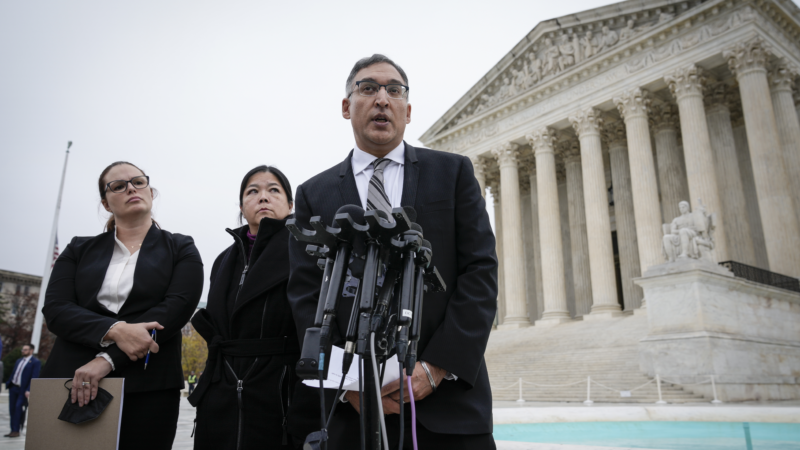Kenyan Student Reaction
The table is covered with bright fabric, traditional Massai clothing. A decorative cloth with tall, lanky African figures hangs above.
“We have necklaces. That is beads and bone and all that wood. We have carvings that’s wood. We have Kenyan tea. That is pure Kenyan tea from Kenya.”
Carol Maina mans one of the Kenyan booths at the UAB International Bazaar. Kenyans represent one of the largest foreign born, student populations at the university. And today’s event gives them a chance to show off their homeland. A passer-by squeals over one of the little hippo carvings, eagerly forking over the five bucks to make it her own. That safari image of a hippo is perhaps what most Americans associate with Kenya. Not the violence that’s gone on for more than a month, killing almost 1,000 people and displacing nearly 300,000. It’s especially shocking for a native.
“It was something we had never heard, never seen. We were worried for our families, so we had to call and all the phone lines were jammed. And it was a scary experience to be here and not know what’s happening to our families.”
Maina’s family is safe. She says they haven’t been directly affected. That’s not the case for the Mercy Mwariah.
“My sister lives in a…they live in a pretty nice housing estate that is right next to the slums of Kibera.”
That’s been a hotbed of activity in Nairobi.
“They had to move from their home for a couple of weeks. Go and live with my sister that lives a little further in the suburbs.”
The violence disrupted school for her nephews. Someone had to watch their house while they’re away. After things settled down, they returned. But earlier this week, opposition lawmaker Mugabe Ware was gunned down in front of his home.
“I didn’t realize that he was actually a neighbor to my sister. I mean they watched the action live. Then the kids were traumatized. They could hardly sleep last night.”
All this is unusual for an African country that had largely escaped the conflict seen elsewhere on the continent. Kenya had built a reputation as a stable country – an emerging economy. A land with breathtaking scenic beauty and culture. Mercy Mwariah says she knew last month’s presidential election would be volatile, but she didn’t expect the death and destruction. Yet it seems a disputed election result was enough to spark a blaze fueled, in part, by unresolved ethnic differences. Differences these Kenyans, like Dena Mwangi, say shouldn’t matter. But…
“I guess now they do. Before I didn’t think that they did. But I guess before it was just lying underneath.”
Mwangi is particularly puzzled by the ethnic dimension to the turmoil because she comes from a mixed family. With more than 40 tribes under the Kenyan umbrella, not to mention built up layers of social and political issues, forging a real resolution is complex to say the least. Still, there’s a persistent hope among the students.
“I just hope they get their perspective back. I think it does need to be more balanced politically. I think that might be the way to go, you know. Not to shut out the opposition completely. Just kind of find a way to balance it.”
Kiongo Muigai however is quite succinct in his assessment of the situation.
“Kenyan people are resilient and Kenya’s gonna bounce back and it’s an awesome country…it’s an awesome country.”
However, all indications are that a resolution will not come easily or quickly. Observers expect the current negations to last for weeks, if not months.
A powerful winter storm is roiling travel across the northeastern U.S.
Forecasters called travel conditions "extremely treacherous" and "nearly impossible" in areas hit hardest by the storm, and air and train traffic is at a standstill in many parts of the region.
U.K. arrests ex-ambassador to the U.S. on suspicion of misconduct over Epstein ties
Police have arrested Peter Mandelson, a veteran Labour Party politician who served as British ambassador to the U.S., as part of an investigation into his ties with Jeffrey Epstein.
What NPR reporters will remember most about these Winter Olympics
NPR's reporters on the ground in Italy reflect on a far-flung, jam-packed Winter Olympics.
In the shadow of the Olympics, migrants search for a welcome in Milan
As Italy cracks down on migration, Milan takes a different path — offering shelter and integration to asylum seekers even as the central government tightens borders and funds deterrence abroad.
Trump to raise global tariffs. And, most say the state of the union is weak, poll says
President Trump says he is raising global tariffs to 15%. And ahead of the president's address tomorrow, most Americans say the state of the union is not strong, according to an NPR poll.
Lawyer in SCOTUS case against Trump’s tariffs says his clients want a refund
Neal Katyal, one of the lawyers who defended U.S. businesses in the SCOTUS case against Trump's tariffs, argues that the federal government must refund them with interest.






